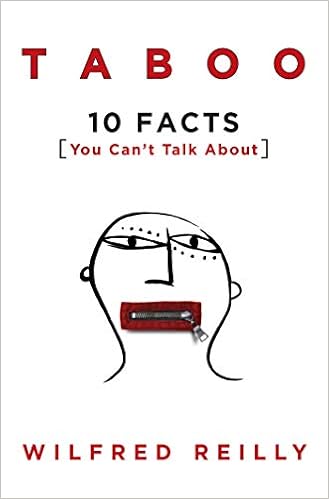These ideas are not merely economic in scope, but rather tackle common social narratives from a statistical point of view in an effort to get an accurate overview instead of an emotional one.
It starts well, introducing its subject:
"Tackling taboos is difficult, but necessary. Very often--MOST often--they are used not to shield strong and valid ideas from pointless attacks, but rather to protect weak ones from worthwhile criticism. The censor tends not to be an individual fully confident he is right, but rather one who is terrified to the core that he is wrong. Only by ignoring the censor's taboos and beginning to speak can we challenge bad ideas, overcome them, and replace them with better ones."
Taboo #1 (I don't intend to list them all) is "The police aren't murdering black people". According to Reilly, "The argument that Blacks are being murdered essentially at will by rogue cops--and white vigilantes, but more about that later--is made astonishingly often by serious people." I have seen this claim, myself, and I have friends who have had regular unpleasant confrontations with cops, but I don't think their anecdotes are any more statistical than mine. The sad truth that Reilly highlights is that criminal behavior really is distributed differently across groups. He cites a particular study by Roland G. Fryer, the youngest African-American ever to receive tenure at Harvard, who found that "there are no racial differences in [rate of] officer-involved shootings." and with the relevant variables controlled for (demographics like age), found that " Blacks were 27.4 percent less likely to be shot at by police relative to non-Black, non-Hispanics".
The research here really is stellar, and it's good to have a very straightforward look at these hot-button issues that Reilly believes are so buried in the narrative that they have become "taboo". However, Reilly shows an unfortunate lack of a principled approach to applying solutions for issues, which becomes especially apparent in the section on immigration, throwing out, as a sort of climax, this notion: "Nations must have the right to choose who their citizens are". It's not further discussed, as if this was uncontroversial.
The number of collectivist premises hiding behind that apparently innocuous notion staggered me. Firstly, it outright places the "nation" as the primary actor and decision-maker, as if people exist to serve the nation instead of the nation existing as an organization for the benefit of *people*. What about individual rights? And who decides what "the nation" chooses? You can't walk down to Washington D.C. and talk to "the nation". Are the majority equal to "the nation"? What about the other 49% of the populace, then? And, that aside (as if it's not bad enough), what would this mean in practice? That the nation can toss out citizens at will? Where will they go, then? If the nation can disown you at will, what are you supposed to do? I can't think of anything more guaranteed to create a perpetual extra-legal underclass.
Statistics are all well and good, but they don't serve you if you forget that people are, first and foremost, individuals.


No comments:
Post a Comment